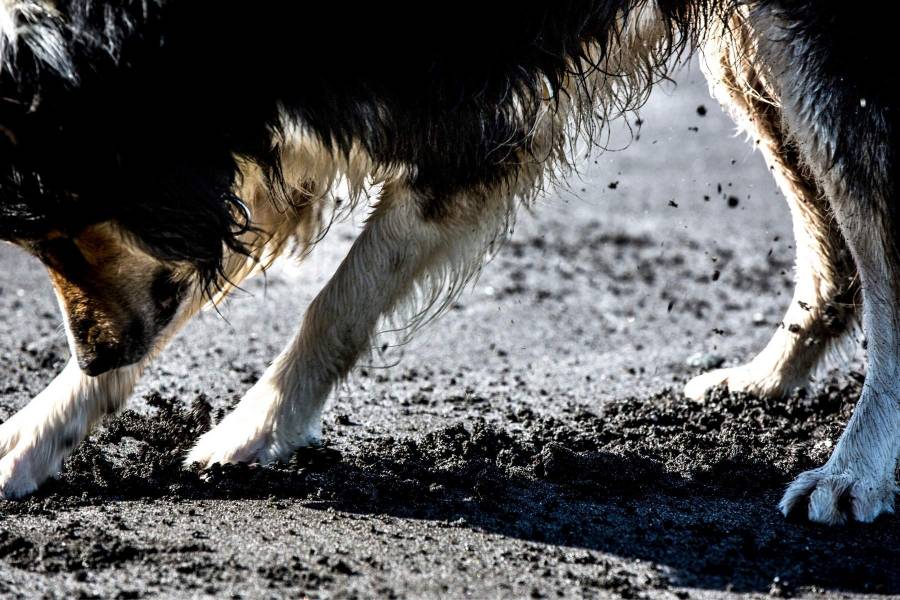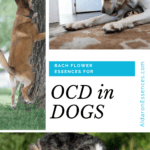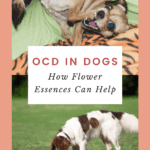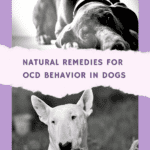OCD episodes in dogs are commonly triggered by emotions like anxiety, frustration, and excessive neediness. Bach flower remedies balance and ease extreme emotional responses, making them a promising natural therapy for reducing canine compulsive behavior.
Introduction
Canine compulsive disorder – commonly known as OCD in dogs – is an uncommon but serious behavior problem in dogs.
Light and shadow chasing; spinning in endless circles; non-stop licking of floors, furniture, limbs; compulsive eating; inexplicable rituals triggered by the least excitement or stress… OCD behaviors in dogs may sound funny, but they can present a huge challenge to live with.
Fortunately, only about 3% of dogs demonstrate true compulsive behavior. But for those dogs and their owners, the impact on quality of life can be staggering.
Canine compulsive disorders can be caused by a variety of genetic, environmental, and relationship factors. These stress factors bring on out-of-balance emotions, which then play a pivotal role in triggering and maintaining repetitive and compulsive behaviors. OCD treatment plans involve detailed training and management strategies and, frequently, pharmaceutical intervention.
Stress, anxiety, insecurity, impulsiveness, fixation – these are all typical of the extreme emotional states common in dogs with OCD. And since Bach flower remedies balance and alleviate emotional extremes,  it makes sense to wonder whether they could help afflicted dogs.
In my experience, Bach flowers can noticeably improve OCD behavior, especially when compulsive reactions have not had a chance to get firmly entrenched. I’ve had clients who have reported significant positive impact from Bach flower blends.
Where compulsive behavior has strong genetic components, and when the compulsive behavior has generalized and become severely habitual, Bach flowers can still help but are more likely to be used as one support among several.
To successfully treat OCD in dogs, an overall treatment plan of training, management, and behavior modification should be in place. Dietary modifications may be necessary. Additional natural supplements and/or prescription medication may be needed to level out the dog emotionally. (Which brings me to yet another great aspect of flower remedies: they are safe and effective when used alongside both alternative and conventional therapies.)
In this article, I’ll help you select flower remedies to help balance the emotional extremes that accompany OCD in dogs. After deciding on the Bach flowers that most suit your dog’s needs, you can purchase the individual remedies locally or online and mix your own blend. FYI: Most flower remedy experts suggest limiting your selection to between 4 and 7 essences at a time.
A convenient alternative to buying all the remedies individually and blending them yourself is to use a flower essence blending service like the Custom Dosage Bottle at Flower Essence Services. You can order the exact blend you want and have it mixed for you and mailed to your door. Then, if that blend works well for your dog and you decide you’d like to buy all the remedies for the blend, you’ve already given it a test run.
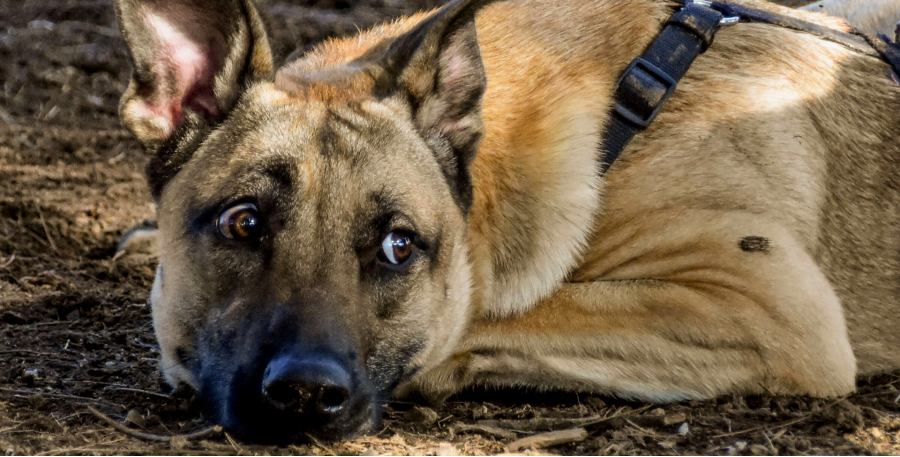
Â
The Role of Emotion in Canine Compulsive Behavior
Although a variety of genetic, environmental, and relationship factors are involved in canine compulsive disorders, it’s undeniable that emotions play a pivotal role in developing, triggering, and maintaining repetitive and compulsive behavior in dogs.
Which emotions are commonly cited as causing or trigging OCD episodes in dogs?
- Anxiety, fear, insecurity, panic
- Frustration, arousal, and impulsivity
- Anticipation of conflict
- Neediness and attention-seeking
- Melancholy and depression
Â
Other emotional states associated with OCD behavior in dogs
Other emotions may be associated with canine compulsive behavior, either laying the groundwork for OCD, or that develop as a by-product of ongoing OCD behavior.
- Aggression
- Inflexibility (mental and emotional)
- Territoriality
- Fixation
- Trauma
- Exhaustion (physical and/or mental)
- Over-sensitivity to emotions, energy
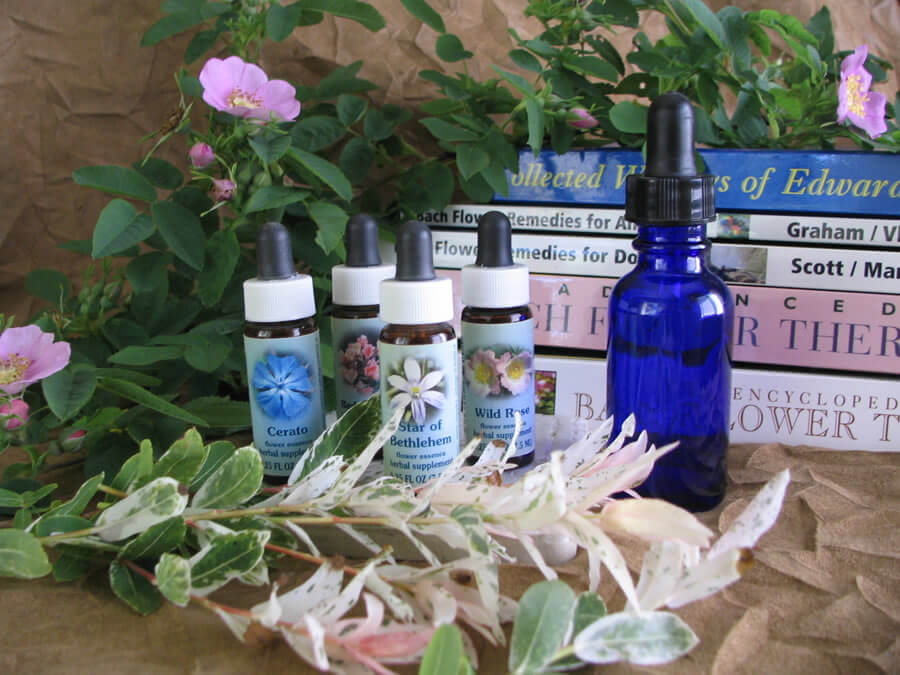
Bach Flower Remedies for OCD in Dogs
Compulsive disorders in dogs are recognized to have emotional causes, triggers, and effects. Since Bach flower remedies balance emotional states that have become, shall we say, maladaptive, they can be an ideal natural aid for the extreme emotions typically found in OCD dogs.
Below, I’ve grouped Bach flowers to consider under the emotional states and influences often associated with compulsive and repetitive behavior in dogs.
Keep in mind, as you look through the possible Bach remedies, that you want to limit your choices to no more than 6 or 7 essences. This will help keep your dog’s blend targeted to his or her individual needs. (Learn more about choosing Bach flowers to blend for your dog.)
​
Bach flowers for trauma and stress in dogs
Rescue Remedy. For highly stressed dogs, Bach Rescue Remedy (also known as Five Flower Formula) is always a good choice. Not only does this renowned blend of five Bach flowers provide calming stress relief, it will help resolve unresolved emotional trauma from past traumatic events (even long past).
Star of Bethlehem. If your dog is in need of comfort, possibly due to recent or past traumatic events, Star of Bethlehem is an ideal choice to begin emotional healing.
Bach flowers for obsession and fixation in dogs
White Chestnut. The inability to mentally relax and stop fixating is classic in OCD dogs. White Chestnut reduces mental chatter and quiets obsessive thoughts.
Chestnut Bud. A strong tendency for behaviors to become habitual patterns is another classic characteristic of OCD dogs. Chestnut Bud remedies the strong tendency to form unhelpful habits by improving your dog’s ability to form new pathways of balanced learning.
Bach flowers for anxiety and fear in dogs
Aspen and Mimulus. Obsessive-compulsive behaviors are often triggered by anxiety. When anxiety is a component of your dog’s OCD behavior, Aspen and Mimulus are the Bach remedies of choice. Aspen helps to relieve vague foreboding and general anxiety. It improves confidence and a sense of self-security. Mimulus restores courage and relieves anxiety from specific, identifiable fears. Mimulus and Aspen complement each other very well and are frequently used together.
Rock Rose. If your dog has panic – fight, flight, or freeze reactions to stressful situations – use the Bach remedy Rock Rose to address the panic and restore calm courage.
Cherry Plum should be added if there is a loss of control, i.e. “freaking outâ€.
Agrimony. Some dogs respond to tension in the home – fighting, arguments, etc. – by redirecting anxiety internally. These dogs often put on a brave face or even try to diffuse tension with silly antics. (Although, others will run and hide at the first hint of conflict.) With this type of dog, Agrimony should be used to reduce the tendency to internalize stress.
​
Bach flowers for neediness, insecurity, attention-seeking, and behavior-driving in dogs
Neediness and insecurity are frequently cited as common traits of dogs with OCD tendencies. There are several Bach flowers that can help with these issues in dogs.
Mimulus is a good choice for restoring balance to the that’s insecure, easily intimidated, nervous, and timid.
Larch will help a dog that isn’t insecure and underconfident by nature, but whose confidence has been set back by some scary or intimidating event.
Cerato will help the dog who remains in an immature, “perpetual puppy†mindset, who always looks to stronger personalities to show him what to think and do.
Heather. Some compulsive dog behaviors may develop and become habitual because they are reinforced with attention. The Bach flower Heather can be very effective at reducing excessive attention-seeking in dogs.
Dogs bred to work – such as livestock herding dogs – excel at behaving in ways that get others to react. When dogs of herding and other working breeds have no outlet for their inner drive to work, they may invent “substitute workâ€. This can include “pushing†the behavior of family members (or one special person) to act in a particular way.
Chicory. If your dog’s OCD behavior has a controlling, driving element, Chicory is the flower essence of choice. Chicory reduces manipulative, controlling behaviors and helps restore a healthier balance to the relationship.
Both attention-seeking and controlling motivations are typically associated with a particular relationship. That is, they are more pronounced with a particular person, rather than with all people in general.
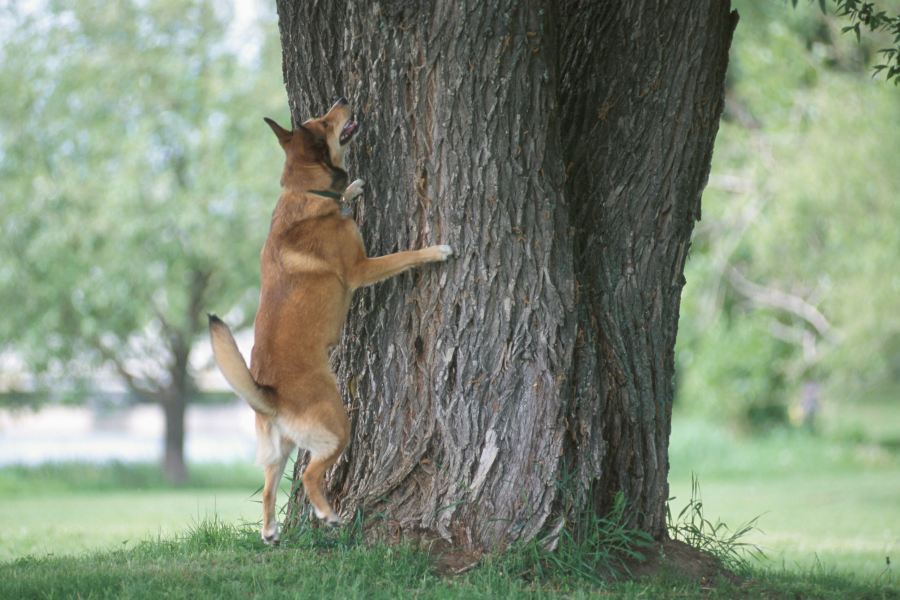
Â
Bach flowers for frustration, arousal, impulsivity in dogs
Cherry Plum. When there is explosive or compulsive loss of control, Cherry Plum will help restore calmness and presence of mind.
Impatiens. For physical tension, and impatient, edgy, irritable feelings, Impatiens restores patience, gentleness and cooperation.
Vervain. The natural intensity of high strung, tightly wound dogs can spill over into other areas of behavior. Vervain helps restore healthy balance to these extreme personalities.
​
Bach flowers for inflexibility, territoriality, difficulty adapting to change
Rock Water. For dogs that are inflexible, stubbornly insisting on rigid routines, Rock Water softens attitudes and restore a more “flow withâ€, emotionally flexible mentality.
Territorial behavior in dogs can be an example of inflexibility and rule-setting. Rock Water can help ease rigid mindsets and reduce territorial triggering behavior in OCD dogs.
Chestnut Bud. For difficulty adapting to change, too easily getting stuck in ruts or habits, Chestnut Bud improves the ability to learn new ways of doing things and reduces repetitive, habitual behavior.
Bach flowers for aggression and conflict in dogs
OCD dogs may become aggressive when frustrated. This aggression may be directed at nearby objects, people or animals; it may get redirected onto a favorite object; or it may become self-directed, as with dogs that obsessively injure themselves.
Holly. The Bach flower remedy Holly is appropriate for all aggression, anger, and vexation with OCD dogs. Holly reduces feelings of anger, hatred, and jealousy, and is remarkable in its ability to “heal the heart†(emotionally speaking, of course).
Vine. For dogs that reactively, compulsively abuse those around them, turning into aggressive bullies when agitated, Vine reduces forceful domineering behavior, and improves peaceful communication.
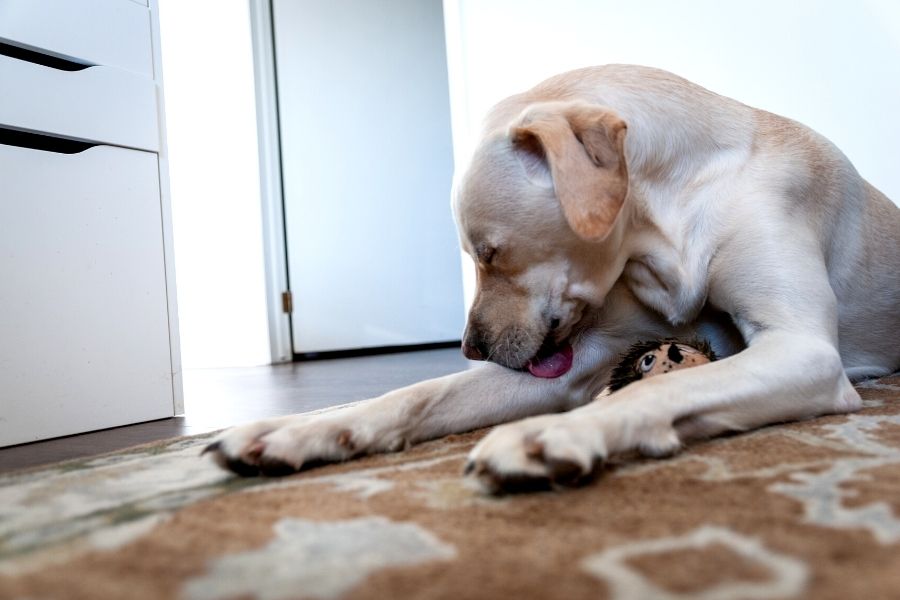
Â
Bach flowers for over-sensitivity in dogs
Beech. If your dog lacks tolerance to what should be minor changes in his environment, relationships, or routines, Beech can help reduce oversensitivity to these various “irritantsâ€.
Walnut. For dogs that are over-sensitive to outside influence of environmental energies, strong personalities or emotions, changes associated life stages, Walnut stabilizes and buffers.
Crab Apple. For dogs that are over-sensitive regarding their personal cleanliness, to the point of obsessive grooming, Crab Apple restores a more balanced, healthy mindset.
Agrimony. If your dog is sensitive to arguments and tension in the home, so that he either runs and hides, or tries to distract when tensions arises, Agrimony helps restore a more relaxed, less fretful attitude.
Oak. If your dog resorts to obsessive behavior if there is no clear occupation to keep him from doing otherwise, Oak strengthens emotional stamina and helps prevent switching off into repetitive behaviors.
Bach flowers for overwhelm in dogs
Elm. For dogs that have too much responsibility or pressure, or for too long a time, or that are having trouble dealing with pressure due to age, illness, general stress: Elm improves emotional stamina and reduces overwhelm.
Sweet Chestnut. For dogs experiencing severe emotional distress, to the point of appearing at their wit’s end, Sweet Chestnut is an ideal choice.
Bach flowers for exhaustion in dogs
Olive. For emotional exhaustion from constant mental or physical activity  in OCD dogs, the Bach flower Olive restores energy and stamina.
Oak may be used to strengthen perseverance and emotional endurance. Oak may also be used to build your dog back up emotionally after prolonged stress and pressure.
Bach flowers for melancholy and depression in dogs
Wild Rose. Dogs that have lost interest in previously enjoyed activities, that need help to relax, enjoy life, be more spontaneous, will benefit from the Bach flower remedy Wild Rose.
Mustard. If your dog’s OCD is triggered by sadness, melancholy and lack of interest, Mustard can be very helpful in its ability to lift the “dark cloud†of sadness and gloom. (Keep in mind that depression can be a sign of serious physical illness. A thorough veterinary exam is called for to rule out physical causes for depression in dogs.)

Â
North American Flower Essences for OCD in Dogs
I include several North American flower essences to consider. I’ve found North American essences to be quite effective in general, although I haven’t experimented much with them with regards to OCD in dogs. Still, these sound promising:
Chamomile can be of great help for emotional tension that is centered in the stomach. This could include stomach tension, butterflies, tendency to nausea or compulsive eating when stressed or anxious.
Lavender is a North American remedy for nervous overwhelm. It has a calming, soothing effect.
Dill remedies emotional tension caused by too much stimulation coming from the environment.
Pink Yarrow may help with dogs that are sensitive to overwhelm from the emotional tension of those around them.
Snapdragon balances the tendency for tension to become focused in the mouth and jaws.
Nasturtium is an interesting possibility for canine OCD, in that it remedies the tendency to overuse the mental (thinking) forces.
Dandelion relieves the tendency for tension and stress to accumulate in the muscles.
Conclusion
Because flower remedies are not simply a natural anti-anxiety treatment, but can directly “re-tune†out-of-balance emotional states in dogs (and any animal or human), they are a natural therapy with a lot of untapped potential for compulsive and repetitive behavior in dogs.
If you’re looking for a drug-free alternative to reduce the anxiety, stress, impulsiveness, and fixation common in dogs with OCD, the natural, gentle, balancing action of flower remedies may well be worth looking into.
More helpful resources for OCD in dogs
If this article has whetted your appetite for more info on the causes, triggers, and treatments of compulsive behavior in dogs, I’ve included some further resources for you:
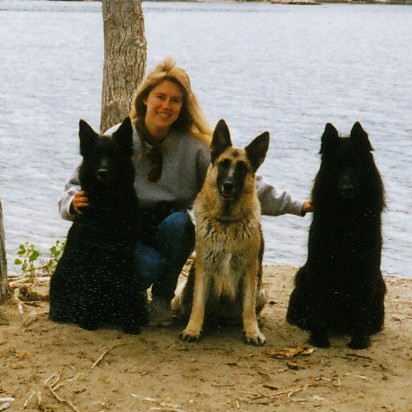
Julie Cantrell BSc is a professional dog trainer and canine behavior consultant who’s logged many thousands of hours training dogs and teaching owners since 1990. Flower essences have been part of her work with canine behavior since 1994. (bio)

